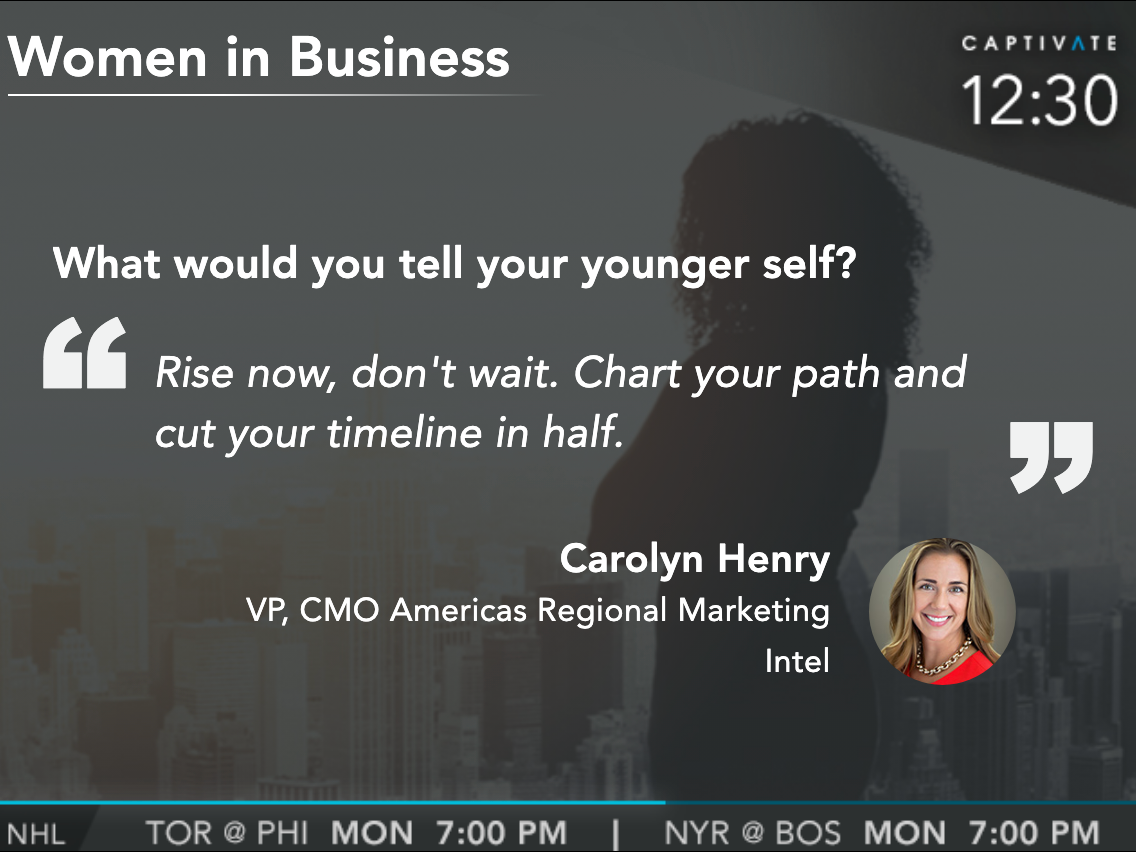Women in Business: The Confident Communicator

In honor of International Women's Day and Women's History Month, Captivate, North America's leading digital out of home video network, is back with another deep dive into the ever-evolving role of women in business.
Impostor syndrome, inner saboteur, insecurities: However you spell it out, much ink has been spilled (and many pixels have been placed) about doubts that plague women in the workplace. Fortunately, an impressive 40% of women say they are “never” struck by self-doubt, a new Captivate Office Pulse study of professionals in the US and Canada found, a higher proportion than men (31%). This motif plays out across this year’s Women in Business series, a celebration of self-advocacy and confident communication.
In the keystone of the series, Captivate is giving female professionals across North America a platform to share their insights.Over 100 leaders from brands such as T-Mobile, Wyndham Hotels & Resorts and PepsiCo offered advice on self-advocacy, underrated leadership traits and staying driven.
“Success is intentional. Decide what you want, believe in yourself and the possible, take action, and be willing to put in the effort.” – Erin Wilson, VP Marketing, HomeEquity Bank
When asked if they felt their success was deserved, 46% of women said that not only did they earn their spot, but they’re also aspiring to even higher echelons. One of the groups most likely to feel this way? Female self-professed risk-takers, who said they’d be willing to take either small or big risks to further their career.
66% of female respondents to the Office Pulse study said they considered themselves to be risk-takers in the workplace. While small risks (55%) were more popular, 18% were willing to take big swings to get where they wanted to go. The primary motivation for going out on a limb? The opportunity to make more money, which drove 70% of female risk-takers. Other motivators included the encouragement of a leader (39%) and a past success (32%).
“I try to take lessons from what goes well and, more importantly, what doesn't go well, to become better EVERY day.” – Janice Barbosa, Senior Marketing Media Manager, T-Mobile
“Risk” can conjure images of cliff edges and snake-filled pits – or in the professional world, high-stakes negotiations or bold branding choices. For some, though, every conversation presents an element of risk. 34% of women said they did not consider themselves risk-takers at work, and the primary deterrent was “looking like I don’t know as much as I should,” easily trumping “failing at something I tried.”
This speaks to the importance of confident communication, which can be challenging for even the most accomplished professionals. 91% of professional women said they used unwarranted apologies like “sorry” or “this might sound dumb/silly” at least some of the time in oral communication, and a whopping 96% said they used moderators like “just,” “sort of” and “I think.”
These verbal crutches were most common among Millennial women (95% and 98%, respectively). Years spent in the workforce – or even just on the planet – can bring confidence: More than 1 in 5 (22%) Baby Boomer women said they “never” use unwarranted apologies when speaking.
“Never apologize for something that does not warrant an apology. However, always be accountable for your own behavior and your contribution.” – Marissa Yoss, VP, Media & Brand Marketing, Wyndham Hotels & Resorts
“I use my voice regardless of who wants to hear it. If I don't speak up, who will?” – Jamie Dorfman, SVP Media Innovation Director, Mediahub
When looking to the future, both men and women named increasing their income and achieving work-life balance and flexibility as their top two career aspirations. However, exploring new career opportunities or fields took bronze for women, while men’s No. 3 was attaining higher leadership positions.
Naturally, goals shift with the seasons of life. Millennial women were more likely than other generations to place importance on attaining higher leadership positions, while more Gen X women named “pursuing further education.”
Just over 1 in 3 women (35%) have charted a clear career path for themselves in the next 3-5 years, essentially in line with their male counterparts. Early-career women (those in the workforce for 8 years or less) were more likely to have a plan (52%) than not (48%), while just 23% of those working for 8-14 years said they had a clear roadmap.
Whether you have a detailed blueprint or just a back-of-the-napkin sketch, keep your goals within sight. Knowing what you want is the first step to advocating for yourself; even if it’s a step outside your comfort zone, when we bring our best, complete selves to work, everyone benefits.
“Be comfortable with being uncomfortable. When you're uncomfortable it means you're stretching your limits and growing, and it will lead you to be a stronger, more confident person.” – Kate Brady, SD, Head of Creative & Content Transformation, PepsiCo
Posted at MediaVillage through the Thought Leadership self-publishing platform.
Click the social buttons to share this story with colleagues and friends.
The opinions expressed here are the author's views and do not necessarily represent the views of MediaVillage.org/MyersBizNet.

